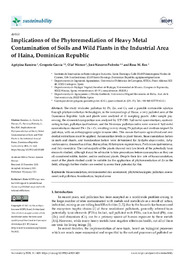Título :
Implications of the Phytoremediation of Heavy Metal Contamination of Soils and Wild Plants in the Industrial Area
of Haina, Dominican Republic |
Autor :
Ramírez, Agripina
García, Gregorio
Werner, Olaf
Navarro-Pedreño, Jose 
Ros, Rosa M. |
Editor :
MDPI |
Departamento:
Departamentos de la UMH::Agroquímica y Medio Ambiente |
Fecha de publicación:
2021-01-29 |
URI :
https://hdl.handle.net/11000/37896 |
Resumen :
The study evaluates pollution by Pb, Zn, and Cr, and a possible sustainable solution
through phytoremediation technologies, in the surroundings of Haina, a very polluted area of the
Dominican Republic. Soils and plants were analyzed at 11 sampling points. After sample processing,
the elemental composition was analyzed by ICP‐OES. Soil metal concentrations, contaminating
factors, pollution load indexes, and the Nemerow pollution index were assessed. Soil metal
concentrations showed Pb > Zn > Cr, resulting in very strong Pb pollution and medium‐impact Zn
pollution, with an anthropogenic origin in some sites. This means that some agricultural and residential
restrictions must be applied. Accumulation levels in plant tissues, bioaccumulation factors
in roots and shoots, and translocation factors were determined for Acalypha alopecuroidea, Achyranthes
aspera, Amaranthus dubius, Bidens pilosa, Heliotropium angiospermum, Parthenium hysterophorus,
and Sida rhombifolia. The vast majority of the plants showed very low levels of the potentially toxic
elements studied, although it may be advisable to take precautions before consumption as they are
all considered edible, fodder, and/or medicinal plants. Despite their low rate of bioaccumulation,
most of the plants studied could be suitable for the application of phytoremediation of Zn in the
field, although further studies are needed to assess their potential for this.
|
Palabras clave/Materias:
bioaccumulation
environmental risk assessment
phytotechnologies
pollution assessment
soil pollution
translocation
tropical areas |
Área de conocimiento :
CDU: Ciencias puras y naturales |
Tipo de documento :
info:eu-repo/semantics/article |
Derechos de acceso:
info:eu-repo/semantics/openAccess
Attribution-NonCommercial-NoDerivatives 4.0 Internacional |
DOI :
https://doi.org/10.3390/su13031403 |
Publicado en:
Sustainability 2021, 13(3), 1403 |
Aparece en las colecciones:
Artículos Agroquímica y Medio Ambiente
|
 La licencia se describe como: Atribución-NonComercial-NoDerivada 4.0 Internacional.
La licencia se describe como: Atribución-NonComercial-NoDerivada 4.0 Internacional.
.png)
